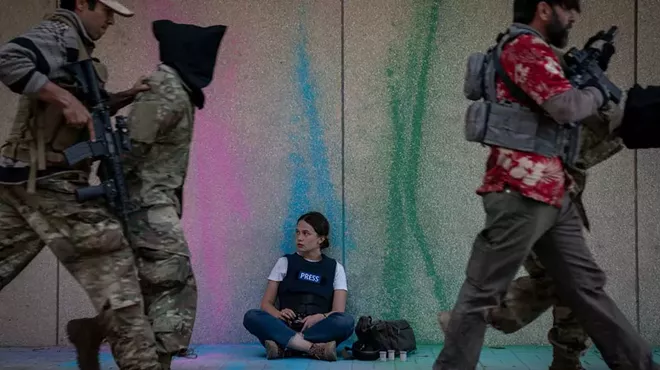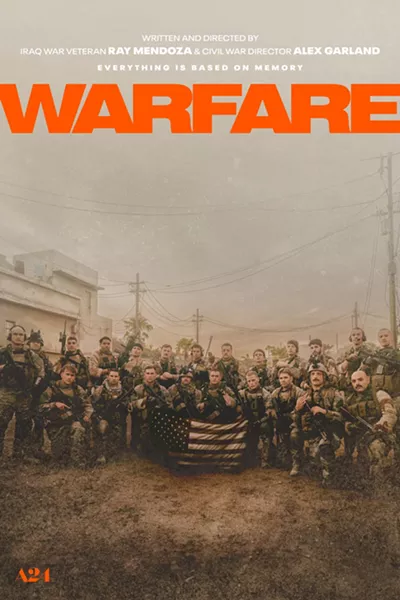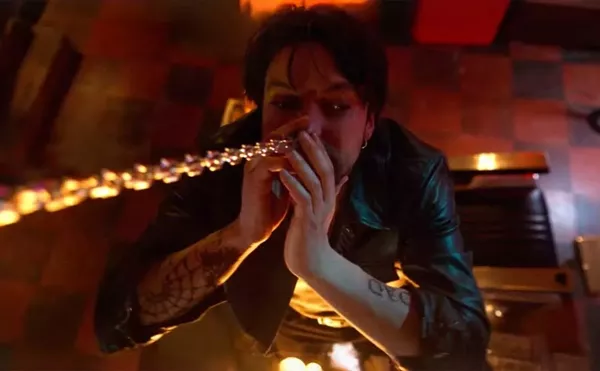Alex Garland’s ‘Warfare’ lacks a satisfying narrative by design
Based on a true story, this war film makes military engagement look like a pointless hell


Audio By Carbonatix
[
{
"name": "GPT - Leaderboard - Inline - Content",
"component": "35519556",
"insertPoint": "5th",
"startingPoint": "3",
"requiredCountToDisplay": "3",
"maxInsertions": 100,
"adList": [
{
"adPreset": "LeaderboardInline"
}
]
}
]
If we made a list of some of the most underrated writers/filmmakers currently working, somewhere near the top of that (fairly long) catalog would be Alex Garland. While he has had a few massive successes, most of his work is barely noticed by general audiences. And even though he has gotten wide critical acclaim for most of his working life, he hasn’t had the career he has earned. Let me break down his oeuvre for a second.
Garland started as a novelist, writing The Beach (which would eventually get adapted into a decent Leonardo DiCaprio movie by Danny Boyle), The Tesseract, and The Coma: all three novels being flawed, but compulsively readable. It’s his screenwriting work, though, that really introduced him to the world, especially after writing the zombie classic 28 Days Later. He then wrote the scripts for the unsung sci-fi head-trip Sunshine, the gorgeous adaptation of Kazuo Ishiguro’s Never Let Me Go, and the comic book bloodbath Dredd. The only thing these three movies have in common (aside from crystallizing Garland as a defiantly singular writer who metastasizes high-concept ideas into character-driven science fiction) are their failures at the box office.
Still, his directorial work is where we start to see how fathomless Garland’s imagination can be. With Ex Machina, Annihilation, Men, and Civil War, he weaponizes our familiarity with cinematic conventions and subverts them into films that can hardly be called crowd-pleasing. From the quiet, cold desperation of Ex Machina to the New Weird wasteland of Annihilation, to his fearlessly inventive limited series Devs, and then around the bend to the properly disturbing Men and the presciently haunting Civil War, Garland consistently finds the dark center of our cultural moments and unspools them like experimental, grown-up fairy tales.
In a way, his newest film (along with co-writer and co-director Ray Mendoza) Warfare is his most experimental so far. It follows the true story of Mendoza and a team of Navy Seals in Ramadi that take control of a house in enemy territory, become surrounded by combatants, and get into a wildly ugly firefight as they desperately wait for rescue. That’s the whole movie: this small group of Seals in the middle of a protracted battle, waiting for exfiltration.
Filmed in almost real-time, Warfare exists almost as a rebuttal to anyone who thinks films should have a normal narrative structure and all that entails. While the performances are strong across the board (especially from Cosmo Jarvis, D’Pharaoh Woon-A-Tai, Charles Melton, and Michael Gandolfini), the film is more an exercise in technical filmmaking than a stereotypically “satisfying” war movie. With immersive sound design and propulsively intense filmmaking, Garland and Mendoza have created what amounts to more of a sensory experience than an actual story.
By completely removing the context of why the Seals are there and the specific purpose of their mission, we’re only left with the visceral horror of violent death and war. There is heroism without false equivalencies to jingoistic patriotism. There are constant gunfights that, instead of being thrilling, are designed to look like the beginnings of a lifetime of PTSD. The men are brave, cowardly, callous, insane, broken, and terrified in equal measure, but it all feels built from the specificity of Mendoza’s memories of the incident and not from what some screenwriter in Burbank thinks war is like.
In a way, Warfare is one of the finest war films ever made simply for the fact that it makes military engagement look like a pointless hell that can only ever destroy life. Is the movie compelling? Very much so. Satisfying narratively? Not remotely. This isn’t Garland and Mendoza trying to make a movie that people actually enjoy. Instead, it’s cinema as a witness, saying, “This is what happened and what kind of people we were when it did. We fought, we died, we laughed, and we screamed for our families for reasons unclear and we did it in a time where war was all we knew how to do and we should never do it again. Ever.”
It’s a heartbreaking statement of purpose to create something so ugly and authentic, and the film exists as another of Garland’s black mirrors, reflecting one or two of our greatest traits as humans through the prism of our worst impulses.
Grade: B+







